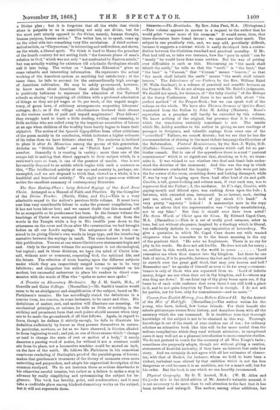SERMONS. —The Beatitudes. By Rev. John Peat, M.A. (Rivingtons.) —This volume
appears in answer to a request to the author that he would print "some more of his sermons." It would seem, then, that these discourses have found favour; we cannot see their merit. The subject is one peculiarly rich, and, wo may add, peculiarly difficult, because it suggests a contrast which is easily developed into a contra- diction between the Christian standard and practical morality. If Mr. Peat had told us, to take one instance, how the " poor in spirit " can be " manly " he would have done some service. But his way of getting over difficulties is such as this. Discoursing on " the meek shall inherit the earth," he tells us that the " earth " is " the land," that "the land" is "Canaan," that "Canaan" means " heaven ;" so that "the meek shall inherit the earth " moans " the meek shall inherit heaven." The Inheritance of our Fathers, by the Rev. William Baird (W. Wells Gardner), is a volume of practical and sensible lectures on the Prayer-Book. We do not always agree with Mr. Baird's judgments. We should not speak, for instance, of "the lofty charity " of the Bishops at the Savoy Conference. And there is too much talk about " the perfect method " of the Prayer-Book ; but wo can speak well of the volume on the whole. We have also Thirteen Sermons of Quirico Rossi, translated from the Italian by John M. Ashley (Masters). Rossi's reputation as a preacher will hardly be extended by this volume. We know nothing of the original, but presume that it is coherent, which the translation certainly sometimes is not. The merits which Mr. Ashley ascribes to his author in giving us now readings of passages in Scripture, and valuable sayings from some one of the "accredited" Fathers, we cannot discern ; but we see that ho has the recommendation of abusing in tho most violent language the Churches of the Reformation. Pastoral Reminiscences, by the Rev. J. Wylie, D.D. (Carluke: Cossar), consists chiefly of sermons which call for no par- ticular remark. But in one of the appendices there is a real " pastoral reminiscence" which is so significant that, shocking as it is, we trans- cribe it. It was wished to see whether two deaf and dumb lads under- stood the doctrine of the atonement. And this was the way in which three ministers conducted the inquiry. " The poor lads were put into the far corner of the room, crouching down and looking dismayed, while F. was by way of heaping upon them load after load of sin and guilt. Crosbie, a tall, gaunt-looking and solemn man, if ever such was, was to represent God the Father ; I, the mediator. At F.'s sign, Crosbie, with gaping mouth and dilated eyes, was rushing down upon the lads ; I, between, with extended arm, interposed. In an instant, each, darting past me, seized, and with a look of joy shook C.'s hand." A very pretty " mystery " indeed ! A manuscript note in the copy before us allows that the representation was " utterly unsatisfactory, not to say false." But that it should ever have been acted ! The Seven Words of Christ upon the Cross. By Edward Capol Cure, M.A. (Macmillan.)—This is a sot of really good sermons, sober in tone, but not without eloquence, inspired by a theology which is liberal, but sufficiently definite to escape any imputation of heterodoxy. We give a quotation in which Mr. Capol Cure draws out with wasted eloquence what he conceives to be the latent meaning in the cry of the penitent thief. "He asks no forgiveness. There is no cry for pity in his words. He does not ask for life. He does not ask for mercy ;
no, neither in this world, nor in the world to come 'Lord remember me when thou comest into thy kingdom. Let there be one link of union, if it be possible, between the lost and the saved, one strand to stretch over the great gulf fixed, that may join heaven and hell t Remember me !' ho speaks of himself as soon to be far away ;—remem- brance is only of those who are separated from us. Lord of infinite mercy, forget me not when thou art in thy kingdom, and I—where my sins drag me down ! If one faint ray of thy glory beam upon me, if thy heart be of such wide embrace that oven there I can still hold a place in it, and be not quite forgotten by Thee—it is enough. I do not ask for pardon, nor for love, only for remembrance—and no more.' "






































 Previous page
Previous page